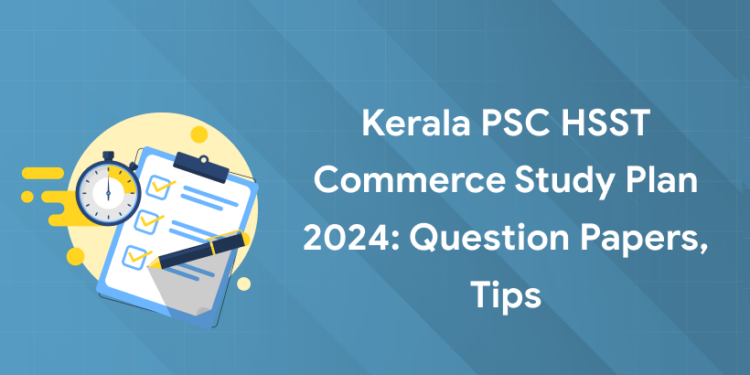Table of Contents
Preparation is the key to success in any competitive exam, and the Kerala PSC HSST Commerce exam is no exception. Whether you’re just starting or are already in the midst of your studies, having a well-structured study plan can significantly enhance your chances of success. So, let’s delve into how you can create an effective Kerala PSC HSST Commerce Study Plan 2024.
Kerala PSC HSST Commerce Recruitment 2024: Quick Overview
| Event | Details |
| Name of Exam | Higher Secondary School Teacher Junior (Commerce) |
| Category Number | 127/2024 |
| Conducted for | Educational Department |
| Exam Organizing Body | Kerala Public Service Commission (KPSC) |
| Level of Exam | State Level |
| Vacancy | Anticipated |
| Application Status | Open |
| Notification Release Date | June 15, 2024 |
| Application Starts | June 15, 2024 |
| Last Date to Apply | July 17, 2024 |
| Recruitment type | Direct |
| Mode of Exam | Online |
| Exam Duration | 1 Hours 30 Minutes |
| Official Website | keralapsc.gov.in |
Kerala PSC HSST Commerce Previous Year Question Paper PDF
1: The first recipient of the ‘Rajiv Gandhi Khel Ratna’ award?
| Year of Exam | |
| 124/2014 | |
| 221/2015 | |
| 003/2016 |
Kerala PSC HSST Commerce Study Plan 2024
Here, we’ll outline a comprehensive Kerala PSC HSST Commerce Study Plan 2024 designed to maximize your preparation efficiency and boost your chances of taking the exam.
Month 1: Foundation and Core Concepts
Week 1: Financial Accounting (Module I)
- Topics: Accounting Principles, Company Accounts
- Day 1-2: Understand Accounting Principles (GAAP, Double Entry System).
- Day 3-4: Learn preparation of Financial Statements (Profit & Loss, Balance Sheet).
- Day 5-7: Practice problems related to Company Accounts.
Week 2: Financial Accounting (Module I contd.)
- Topics: Ratio Analysis, Cash Flow Analysis
- Day 1-3: Master Ratio Analysis (Liquidity, Solvency, Profitability).
- Day 4-5: Study Cash Flow Analysis (Direct and Indirect Method).
- Day 6-7: Practice solving Ratio and Cash Flow problems.
Week 3: Advanced Cost Accounting (Module II)
- Topics: Marginal Costing, Breakeven Analysis
- Day 1-3: Understand Marginal Costing concepts and calculations.
- Day 4-5: Practice Breakeven Analysis and its applications.
- Day 6-7: Solve case studies and practice questions.
Week 4: Advanced Cost Accounting (Module II contd.)
- Topics: Standard Costing, Budgeting
- Day 1-3: Learn Standard Costing techniques and variance analysis.
- Day 4-5: Study Budgeting process and types (Master, Flexible).
- Day 6-7: Practice Budgetary Control techniques.
Month 2: Application and Practice
Week 5: Management Principles and Techniques (Module III)
- Topics: Functions of Management, Organizational Behavior
- Day 1-3: Understand Management Functions (Planning, Organizing, etc.).
- Day 4-5: Study Organizational Behavior (Motivation, Leadership).
- Day 6-7: Practice case studies on management functions.
Week 6: Management Principles and Techniques (Module III contd.)
- Topics: Human Resources Management, Total Quality Management
- Day 1-3: Learn HR Management (Recruitment, Training, Performance Appraisal).
- Day 4-5: Study Total Quality Management principles and techniques.
- Day 6-7: Solve HRM and TQM related case studies.
Week 7: Taxation Laws (Module IV)
- Topics: Income Tax, Indirect Taxes, Tax Planning
- Day 1-3: Understand Income Tax provisions (Heads of Income, Exemptions).
- Day 4-5: Study Indirect Taxes (GST, Excise Duty).
- Day 6-7: Practice solving Income Tax and GST related problems.
Week 8: Research Methodology and Quantitative Techniques (Module V)
- Topics: Research Design, Statistical Tools
- Day 1-3: Learn Research Methodology (Research Design, Hypothesis Formulation).
- Day 4-5: Study Statistical Tools (t-test, ANOVA, Regression Analysis).
- Day 6-7: Practice applying statistical tools to research scenarios.
Month 3: Integration and Revision
Week 9: Management Information System, Security Analysis (Module VI)
- Topics: Management Information System, Data Security
- Day 1-3: Understand MIS components and applications.
- Day 4-5: Study Data Security measures and practices.
- Day 6-7: Solve case studies on MIS and Security Analysis.
Week 10: Recent Trends in Commerce (Module VII)
- Topics: Emerging Trends in Commerce, Current Affairs
- Day 1-3: Read about recent developments in commerce (E-commerce, Blockchain).
- Day 4-5: Study current affairs related to commerce and economics.
- Day 6-7: Review and summarize recent trends and their impact.
Week 11-12: Revision and Practice
- Topics: Comprehensive Revision and Mock Tests
- Day 1-5: Review all modules, focusing on weak areas.
- Day 6-7: Take full-length mock tests under exam conditions.
- Day 8-12: Analyze mock test results, revise concepts as needed.
Month 4: Aptitude and Constitutional
Week 13: Teaching Aptitude (Module VIII)
- Topic: Nature, Objectives, Characteristics, and Requirements of Teaching:
- Day 1-2: Understand the fundamental aspects of teaching, its objectives, and characteristics.
- Day 3: Study the requirements for effective teaching and learning environments.
- Topic: Learner’s Characteristics and Factors Affecting Teaching:
- Day 4: Learn about learner diversity and how different factors influence teaching strategies.
- Day 5: Study methods to address individual learner needs and characteristics.
- Topic: Methods of Teaching and Teaching Aids:
- Day 6-7: Explore various teaching methods (lecture, discussion, demonstration) and teaching aids (audio-visual aids, ICT tools).
Week 14: Research Aptitude (Module VIII contd.) and Indian Constitution (Module IX (a)
- Topic: Research: Meaning, Characteristics, Types, and Steps:
- Day 1-2: Understand the definition, characteristics, and types of research.
- Day 3-4: Study the steps involved in conducting research and their significance.
- Topic: Methods of Research and Research Ethics:
- Day 5: Learn different research methods (qualitative, quantitative, mixed methods).
- Day 6: Understand the importance of research ethics and ethical considerations in research.
- Topic: Salient Features of the Indian Constitution:
- Day 7: Study the Preamble and its significance in interpreting the Constitution.
Week 15: Indian Constitution (Module IX (a) contd.) and Social Welfare Legislations (Module IX (b)
- Topic: Fundamental Rights, Directive Principles, and Fundamental Duties:
- Day 1-2: Explore Fundamental Rights and Directive Principles of State Policy.
- Day 3: Understand the interrelation between Fundamental Rights and Directive Principles.
- Topic: Executive, Legislature, Judiciary, and Other Constitutional Authorities:
- Day 4: Study the structure and functions of the Executive, Legislature, and Judiciary.
- Day 5: Learn about other Constitutional Authorities and their roles.
- Topic: Centre-State Relations and Emergency Provisions:
- Day 6-7: Understand Centre-State relations (legislative, administrative, financial) and emergency provisions.
Week 16: Social Welfare Legislations and Renaissance in Kerala (Module IX (b) and X (a)
- Topic: Social Service Legislations and Programmes:
- Day 1-2: Study major social service legislations (Right to Information Act, Food Security Act, etc.).
- Day 3: Explore social welfare programmes (Employment Guarantee Programme, Organ Donation).
- Topic: Renaissance in Kerala – Socio-Religious Reform Movements:
- Day 4-5: Learn about prominent reform movements (SNDP Yogam, Nair Service Society, etc.).
- Day 6: Study social revolts and struggles during the Kerala Renaissance.
- Topic: Role of Press, Awakening Through Literature, Women and Social Change:
- Day 7: Understand the role of press in the Kerala Renaissance and its impact.
- Day 8: Study literary figures and their contributions to social change in Kerala.
Kerala PSC HSST Commerce Study Tips 2024
Preparing effectively for the Kerala PSC HSST Commerce exam requires a strategic approach to cover all essential topics and ensure systematic revision. Here are some key study tips to help you succeed:
Know Your Syllabus
Familiarize yourself with the detailed syllabus provided by Kerala PSC. Break it down into manageable sections based on the weightage of each topic. Focus on understanding the concepts rather than rote memorization.
Create a Timetable
Allocate specific time slots for each subject and topic according to your strengths and weaknesses. Ensure that you dedicate ample time for revision and practice tests.
Study Materials
Gather high-quality study materials including textbooks, reference books, and online resources. Utilize resources specific to Kerala PSC exam preparation. Make use of previous years’ question papers and mock tests to familiarize yourself with the exam pattern.
Subject-wise Approach
- Commerce and Accountancy: Focus on principles, theories, and practical applications. Practice solving numerical problems.
- Economics: Understand macroeconomic and microeconomic concepts, current economic issues, and Kerala’s economic scenario.
- Management: Learn about principles of management, organizational behavior, HR management, and recent trends in management.
Revision and Practice
Regularly revise the topics you’ve covered to reinforce your understanding. Solve mock tests and previous years’ question papers to gauge your preparation level and improve time management skills.
Current Affairs and General Knowledge
Stay updated with current affairs, especially related to Kerala and India. Brush up on general knowledge topics including history, geography, politics, and culture.












